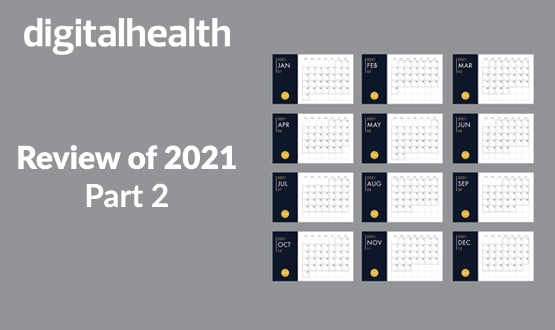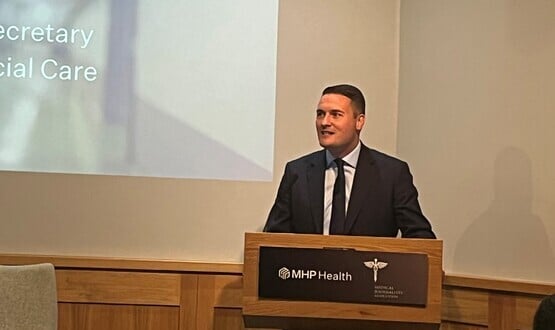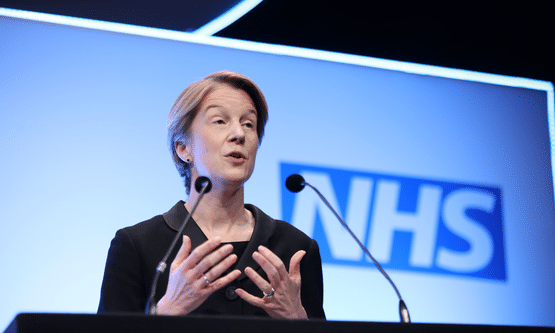Digital Health’s Review of 2021 Part Two: July to December
- 30 December 2021

Our round up of 2021 continues and we now move to the second half of the year and there was definitely not a lull in the world of healthcare IT news.
The latter half of the year saw a number of huge announcements including NHSX and NHS Digital being incorporated into NHS England as well as two Digital Health events.
Join us as we continue to look at some of the biggest stories on Digital Health – starting with July.

We kick things of in July, which was the month when Digital Health’s annual Summer School event took place. The virtual event featured a number of keynotes and panel discussions, including consultant breast surgeon Liz O’Riordan who said she turned to technology so she would not “have to go through cancer alone” after being diagnosed with breast cancer.
The event also featured the newly elected chairs of the Digital Health Networks Advisory Panel who shared their priorities and aspirations for the future.
Finally, July also saw the announcement that Amanda Pritchard had been selected to succeed Sir Simon Stevens as the chief executive of NHS England after serving as the organisation’s chief operating officer.

While we didn’t have much of a Summer in Britain, there was certainly not a drought when it came to news at Digital Health. The start of August, in the midst of the so-called ‘pingdemic’, the NHS Covid-19 app was updated in order to reduce the number of ‘pings’ that people were getting.
The rules surrounding the sensitivity of the app were tweaked – so isolation notices were sent to close contacts two days before the positive test instead of five.
August also saw NHSX publishing its much anticipated ‘What Good Looks Like’ guidance which set out how NHS organisation should be driving digital transformation and what success is.
The guidance was put together with the aim to build on the strides seen in digital and data during the Covid-19 pandemic by providing local NHS leaders with digital success measures they should aim to meet. NHSX hoped the guidance will help leaders and individual organisations accelerate digital transformation across the health service.
On a sadder note, August saw tributes being paid to former NHS Digital deputy CEO, Pete Rose, who passed away at the start of the month. Pete, who was also the organisation’s chief information security officer (CISO), joined NHS Digital in May 2020, as the country was in the middle of the first wave of Covid-19. In their obituary for Pete, NHS Digital spoke of his “energising, inspiring” character, adding that he continue to take pride in his work “throughout a gruelling regime of surgery, chemotherapy and radiation treatment”.

The buzz around Covid vaccine passports returned in September as health secretary, Sajid Javid, confirmed plans to introduce them as proof of vaccination for nightclubs and large events had been scrapped.
The plans would have meant people would have been required to show proof of double vaccination, a negative Covid test or finishing self-isolation after a positive PCR test to gain entry into a nightclub or other large event.
Sticking with Covid passports, September also saw Digital Health News reporting on how the NHS App hit a milestone of 12million downloads since the technology was introduced on the app in May 2021. The NHS App was launched in 2018 and offers other services including symptom checking and triage; appointment booking; repeat prescription ordering; access to patient records; and national data opt-out.

As we welcomed October, there was speculation surrounding a national deal between NHS England and US electronic patient record (EPR) supplier Epic with rumours that Tim Ferris, the new head of digital transformation at NHS England, is a big advocate of the system. While they were just rumours with nothing confirmed or denied, our very own Jon Hoeksma explored the possibility of having a nationwide EPR and what it could mean for the healthcare system.
October also saw Digital Health host its first in-person event in around 19 months as the Autumn Leadership Summit took place in Birmingham. Highlights included Tom Loosemore, who is working in partnership with NHS Providers to lead the Digital for Boards programme. In a keynote, Loosemore told attendees that when it comes to transformational change – the focus should be on culture rather than the technology.
The summit saw the newly elected chairs of the Digital Health Networks speaking together for the first time. Sarah Hanbridge, chair of the CNIO Network called on her fellow digital nurses to “be a stronger voice” to help “drive and influence” the agenda. The chairs also discussed how the Networks can do more to create a national voice and help influence policy.
Finally, the event also saw the winners of the Digital Health Awards announced. The 6,000 members of the Digital Health Networks were asked to vote for the CCIO, CIO, and CNIO of the Year, with a special judging panel selecting the Future Digital Leader of the Year and Digital NHS CEO of the Year, a new category at this year’s awards.

The penultimate month of the year was not short of news stories, with the biggest of them being the announcement that both NHS Digital and NHSX are to be incorporated into NHS England and Improvement. The news came in a letter to staff from NHS England and Improvement’s chief executive, Amanda Pritchard, and said ‘NHS Digital will become the CIO directorate and NHSX will evolve into the strategy function in the Transformation directorate’.
The decision to bring together all the organisations associated with digital and technology was part of a review carried out by NHS Digital’s Laura Wade-Gery. The review recommended ‘a more joined up approach to digital transformation in the NHS national bodies’.
Elsewhere, Covid passports made a welcome return to the news as it was confirmed that the NHS Covid Pass has been accepted as an equivalent to the European Union Digital Covid Certificate. An agreement between the EU and the UK means travellers can now have their vaccination status digitally verified with each other’s Covid vaccination certificate schemes.
The Covid passport news did not stop there as November also saw booster jabs being added to vaccine statuses on the digital pass.

We finally reach the final month of 2021 and December did not disappoint as after a few days of speculation, Oracle confirmed it had acquired global electronic health record (EHR) provider, Cerner, in a deal worth around £22.4billion ($28.3billion). Headquartered in Texas in the United States of America, Oracle defines itself as a “cloud technology company” and offers cloud application and platform services. A report in the Financial Times said that a deal would help cement Oracle in the fast growing health IT sector as Cerner is one of the largest provider of hospital electronic medical systems to the US healthcare market and a leading supplier to the NHS.
December also saw the government committing to ensuring that at least 80% of social care providers have a digitised care record in place by March 2024. The Adult Social Care Reform White Paper, which is part of the government’s wider social care plans, is backed by £5.4billion, which includes at least £150million going towards improving care quality and safety, support independent living through new technology and digitisation such as digital care records, over the next ten years.





1 Comments
Hello – can you give me an indication when 3rd Primary Covid vaccinations will be uploaded on to the welsh gov nhs digital Covid pass
My covid vaccination is listed as a 3rd primary dose – not a Booster and that is where my problem lies
I am asking as I am flying to Abu Dhabi in a few weeks and the UAE will not allow entry if there are not 3 digital vaccinations available on the Covid pass
Comments are closed.